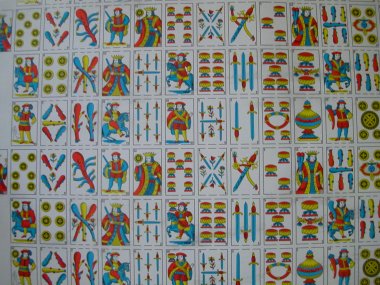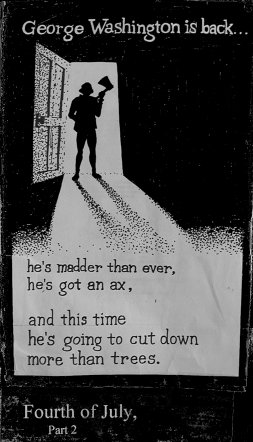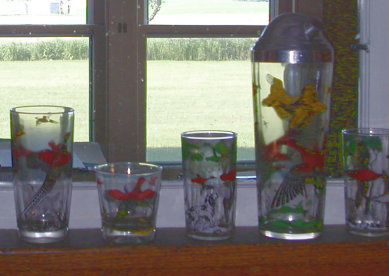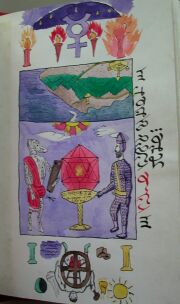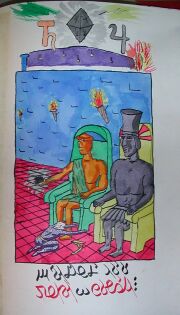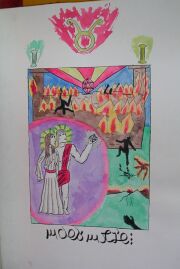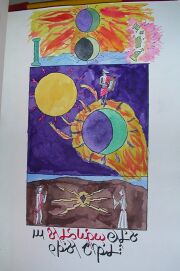Once several years ago I had this dream, as is recorded in my Book of Dreams:A couple of years ago, there was a piece on TV about
the original TV talk show, from way back into the late forties. Turns out it was still on TV, some TV station out in New York City— had been on the air all these years, with its original host— and it had now been "dug up," like some kind of prehistoric fossil.
Last night I had a dream along similar lines, which had me laughing so hard, I couldn't get back to sleep again for the rest of the night. In this dream, I was watching a TV interview. A young nineties type guy is interviewing two old duffers, the producer and director of the
I Love Lucy show— which, incredibly, had actually remained part of the network lineup all these years, only it had sunk into total obscurity.
These two old white-haired duffers sit there— one wearing a French beret, the other with big, heavy, old dark-framed horse glasses— trying to look arty, but they only succeed in looking completely out of touch. And this young nineties fellow is interviewing them...
—"Now, tell me... It's been many, many years, in fact it's been well over a generation now, since Ricky Ricardo has appeared on your show. How have you dealt with this?"
The two old men shift, as if caught off guard.
"Well... actually we haven't gotten around to dealing with it yet... We've been planning, one of these years... "
"You know, we've wracked our brains, trying to figure out a way to deal with that one. We know many of the viewers would be heartbroken."
"We've hoped, we've sort of hoped that many of them haven't really noticed yet..."
"We had toyed with the idea, you know— many, many years back, early on, there was that classic episode where Ricky Ricardo was kidnapped by those green women from Venus. We had played with the idea of doing a remake of that episode, as an explanation of why he was gone. But then we thought— well, no, TV viewers today are much better educated about astronomy, it would never work."
—"And what about Lucy? You know, it's also been many, many years since Lucy has appeared on the show."
At this, the two old men glance at each other, sour and sheepish, chagrined, as if they had hoped to get away without having to deal with this question.
"Well... for a long time there, we got along using those life-size cardboard cutouts..."
"Promotional photos mounted on cardboard, you know."
"But then somehow those cardboard cutouts got misplaced. I don't know, we looked everywhere, we couldn't find them."
"There was a problem, we couldn't take another photo and blow it up to life size and mount it, there was a problem over copyrights."
"I tell you, we've tried everything to track down the owners of those copyrights. We've even placed classified ads in the paper, asking the owner of those copyrights to meet us for lunch."
"But so far, we've just sat there at the restaurant, alone. For whatever reason, nobody has shown up."
The interviewer—"Well, has it ever occurred to you that perhaps nobody has shown up, because you yourselves are the owners of the copyrights?"
The old men look startled. "Well, now I wonder if that isn't a possibility!"
"We'll have to talk to our lawyers about that one!"
—"And what about Fred and Ethel?"
At this, the two men brighten up.
"Fred and Ethel appeared on the show, until they died."
The two old men look considerably pleased with themselves at this reply, as if,
you can't get us on that one!The interviewer runs his hand through his hair. "But how have you managed to keep doing the show all these years, with all the characters gone?"
"Well, for several years there it was a real challenge..."
"We came up with some very innovative camera angles..."
"But then, after a few false starts, we came up with what we feel is the solution. And it's worked out quite well..."
"You see, now we have a group of young people on the show. They're getting together— it's as if
they have been eyewitnesses to the events of the episode— they're getting together, and they're sitting there and talking it over. They're sitting there and it's like, '
Let's rap!'"
"We feel it's worked out quite well."
"We hoped this move would attract more viewers from the younger set."
"It's also made it easier and more economical to do shows that would otherwise have been much harder to do— such as that one episode where Lucy got those tattoos..."
"Or that episode last season, where Godzilla was attacking the city!"
—"Now, how is it, I notice, looking at the network schedule, that your show airs at three in the morning..."
"Well, yes, that was a compromise..."
"Would you believe, at one point there the network actually wanted to cancel the show! But we managed at last to convince them, that with a show with the long history and tradition of ours, ratings could not be the only consideration..."
And then I woke up.
Labels: dreams













